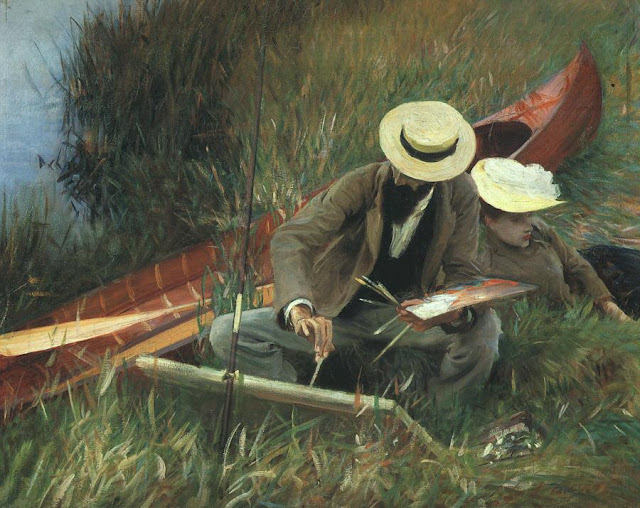He became a close friend of John Singer Sargent, whom he met in Paris in 1878 when Helleu was 18 years old and Sargent 22. Already becoming known, Sargent was getting commissions for work. Helleu had not sold anything, was deeply discouraged and almost to the point of abandoning his studies. When Sargent heard this, he went to Helleu and picked one of his paintings, praising his technique. Flattered that Sargent would praise his work he offered to give it to him. Sargent replied, "I shall gladly accept, Helleu, but not as a gift. I sell my own pictures, and I know what they cost me by the time they are out of my hand. I should never enjoy this pastel if I hadn't paid you a fair and honest price for it." With this he paid him a thousand-franc note. This was perhaps the first thousand-franc note Helleu had ever seen.
 |
| Paul Helleu Sketching with his Wife by John Singer Sargent 1889 |
Helleu was commissioned to paint a portrait of a young woman named Alice Guerin in 1884. They fell in love, and married two years later (28 July 1886). She was undoubtedly his favourite model. Charming, refined and graceful, she helped introduce them to the aristocratic circles of Paris, where they were popular fixtures.
 |
| Portrait of Mlle Alice Guerin 1884 |
In 1904 he was awarded the Légion d’honneur and became one of the most celebrated artists of the Edwardian era in both Paris and London and an honorary member of the most important beaux-arts societies. He was a member of the International Society of Sculptors, Painters and Engravers and the Societaire de la Nationale des Beaux-Arts. He was decorated by the French Government with the Legion d’honneur in 1904. He was the creator of the astrological ceiling decoration in New York City's Grand Central Terminal completed in 1912.
 |
| The ceiling of the Grand Central Terminal in New York City |
By the time of his last trip to New York City in 1920 he realised that the Belle Epoque was over. He felt out of touch and retired to his family life. He died in Paris of peritonitis in 1927.
 |
| c1879 Mademoiselle Ellen Helleu pastel and chalk 32.6 x 30.6 cm |
 |
| c1880 Young Woman in White |
 |
| c1885-90 Portrait de Mademoiselle Granier pastel 95.9 x 64.8 cm |
 |
| c1885 Mademoiselle Ellen Helleu conté crayon, wax crayon, chalk 35.2 x 19 cm |
 |
| 1894 Meditation drypoint 28 x 20 cm |
 |
| c1895 Half-Length Portrait of Alice Helleu, the Artist's Wife chalk and pastel |
 |
| c1895 Woman Looking at a Drawing chalk 63 x 45 cm |
 |
| c1895 Woman Reading drypoint 59 x 44 cm |
 |
| c1895 Woman Seated drypoint 53 x 32 cm |
 |
| 1896 Madame Helleu, Reading on the Beach |
 |
| 1897 James MacNeill Whistler drypoint 50 x 35 cm |
 |
| 1903 James MacNeill Whistler drypoint |
 |
| c1898-1900 Madame Helleu on her Yacht "L'étoile" oil on canvas |
 |
| 1899 On the Sofa pastel |
+drypoint+55+x+35.7+cm.jpg) |
| c1899 Portrait of a Woman Wearing a Hat (Madame Letellier) drypoint 55 x 35.7 cm |
 |
| 1900 Portrait of Mme. Cheruit Wearing a Fur Collar drypoint 50.5 x 40 cm |
 |
| 1900 Young Woman in White oil on canvas |
 |
| c1900 Consuelo Vanderbilt oil on canvas |
 |
| c1900 Half-Length Portait of a Seated Woman, Smoking a Cigarette, Facing Left drypoint 53.9 x 40.9 cm |
 |
| c1900 Woman Seated Leaning Forward, Chin Cupped in Left Hand drypoint 53.5 x 41.1 cm |
 |
| 1901 Le Grand Pavois |
Thanks for showing these things. His work really casts a spell. I always admire his work when I see it, and knew the Sargent painting, but somehow never connected him as the subject in the boat. His oil portraits would make me think his tendency was as a tonalist, but his outdoor work and sketches look like he is absolutely on the same side of the fence as the Impressionists.
ReplyDeletedougstotts.blogspot.com
Thanks Doug, I think you're right, but for me it's his elegant drypoints that show his best side. By the way I like you work :-)
ReplyDeletewow, thanks for saying that. You have a great blog. It's inspiring.
ReplyDelete